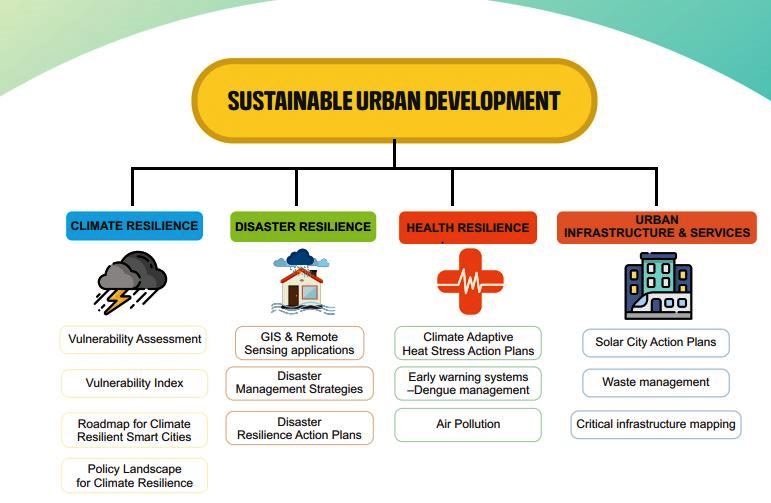Sustainable Urban Development > Overview
Centre of Excellence (CoE), Urban Development and Climate Change
Ministry of Housing and Urban Affairs, (MoHUA), Govt. of India
Integrated Research and Action for Development (IRADe) was designated as a Centre of Excellence (CoE) for Urban Development and Climate Change in 2008, by the Ministry of Housing and Urban Affairs, Government of India. The CoE addresses critical issues related to Urban development and Climate Resilience in India, through capacity building, research and training, integrating various urban development efforts and documenting best practices and policy level prescriptions.
CoE has undertaken rapid vulnerability assessment of 20 cities, devised roadmap for mainstreaming climate and disaster resilience components in the smart city development plans of 10 cities, and piloted urban climate vulnerability index. Committed towards strengthening city health resilience, the COE is actively involved in developing Climate Adaptive Heat Stress Action Plans, Early Warning System for Dengue and Air Pollution Action plans.
The research findings of COE have facilitated decision-making for various ministries, including Ministry of Environment and Forests and Climate Change, Ministry of New and Renewable Energy, Niti Ayog, Ministry of Power, Ministry of External Affairs, Ministry of Urban Development, Department of Science and Technology, among others. COE has also contributed to the low carbon pathways and the Nationally Determined Contributions until 2030 and 2050, and the research outcomes are widely shared in platforms like IPCCSREX, European Union, Rockefeller Foundation (ACCCRN), UN Habitat and other international forums.

Centre of Excellence (CoE) for Urban Development on ‘Climate Change Vulnerability and Adaptation’
IRADe is a Centre of Excellence on Urban development and Climate Change, and carries out projects in the areas of Urban Environment and Development and Climate Change. Besides IRADe, MoUD identified few other reputed institutes from all over India to undertake research and other activities in the areas related to urban development. IRADe’s approach as the Centre of Excellence is broadly based on three focus areas: Research, Knowledge Dissemination and Capacity Building. The research programmes of IRADe includes policy analysis, case studies and dissemination and assists MoUD with activities related to the National mission for Sustainable Habitat (NMSH). The staff participates in the meetings of subcommittees on storm water drainage for developing benchmarks for preparedness for disasters.
IRADe-CoE has worked on the following important topics:
-
Methodology development
A generic framework for climate change and vulnerability was developed in 2009, which depicted that some cities find some sectors more important than others. It is important to carry out several case studies of various typology e.g., metropolitan, medium class I & class II cities or coastal cities, drought prone cities in arid zones and flood- prone cities in the river basins. This gave perspectives on how the process can be streamlined and replicated faster each time than the previous exercise. Moreover, data may not be available regarding all the sectors and they may have to be selective. Some default database, norms and rules of thumb can emerge only when several case studies are completed.
- Rapid Assessment of 14 citiesThis research study has reviewed the literature available on climate change and urbanization, assessment of vulnerabilities of cities to formulate an index for assessing the vulnerability. Analysis and findings of the research study are based on the interpretations of a set of variables that consist of climate, topography, temperature, rainfall, demographic & socio economic facets, urban design & infrastructure, transport, energy use and governance of 14 selected cities of India. To assess the vulnerability of these selected cities, IRADe has developed its methodological framework that includes baseline data pertaining to urban development socio-economic aspects and infrastructure
-
Vulnerability Assessment of Surat and Haridwar
Vulnerability assessment and Climate change adaptation project has been achieved for Surat and Haridwar. Both the cities are different in terms of approach followed for research on vulnerabilities.
Asian Cities Climate Change Resilience Network (ACCCRN)
The Asian Cities Climate Change Resilience Network (ACCCRN) aims to draw attention to invite funding and action on building climate change resilience for poor and vulnerable people by creating robust models and methodologies to address risk through active engagement and analysis of various cities. IRADe is a part of the network that consists of well known institutions such as TERI, TARU, etc.
A policy paper was prepared on Mainstreaming climate change resilience in urban policy framework: Linkages with policies, programs and missions to mainstream climate concerns at national level. The paper deals with the National Urban Sanitation Policy, National Urban Transport Policy and Disaster Management policies with its adaptation and mainstreaming measures. One of the prominent examples, where the city has accepted to live with floods concept, this being significant, similar initiatives have also been taken in Gorakhpur and Indore cities by the ACCCRN. The vulnerability assessment and resilience planning approach evolved by the ACCCRN programme can be adopted by other cities to deal with climate uncertainty. The assessment mainly identifies current vulnerabilities and capacities. Vulnerability analysis through indices in a GIS platform opens up avenues for spatial analysis.
